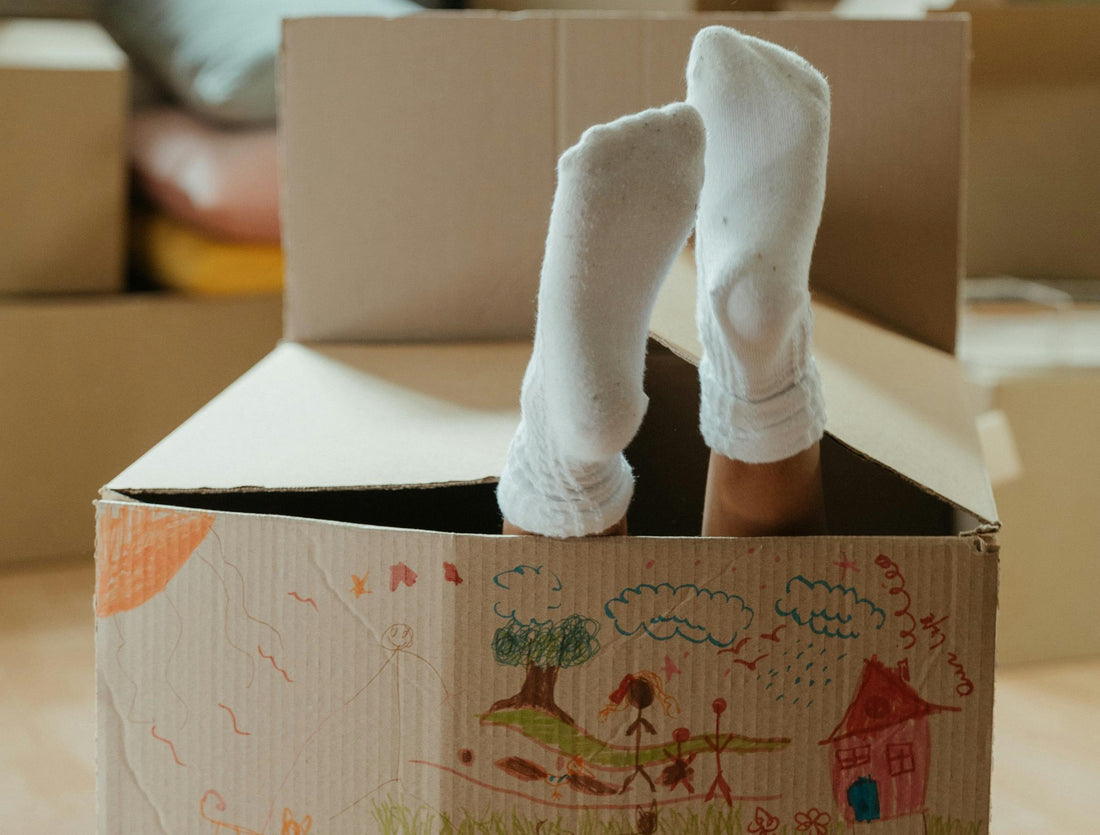There is a reason why children love cardboard boxes, why when you give them a fancy and exciting gift, they spend more time playing with the packaging. It is because open-ended, unstructured play is the best kind of play for children.
It is a time where they can use their imagination to the fullest, problem solve, explore, and communicate their ideas and just generally have fun with constraints. When children lead their own play and have freedom, they develop the most wonderful skills.

So, what does open-ended play actually mean?
It is play that has no start and end, it doesn’t have a structured purpose, there is no end goal, and it is created completely from the child’s imagination. There is no right or wrong way for them to do it, it is play without boundaries.
A great way to encourage this play is to give them objects that could have multiple (in fact endless in a child’s eyes) possibilities. So, cardboard boxes, tubes, plastic bottles, pieces of fabric, yoghurt pots. Basically, let them loose on your recycling!
They also love household items, such as pots and pans, wooden spoons, plastic bowls.
Outside they can use pinecones, conkers, sticks, mud, stones.
Toys that are good for open ended play are small world toys such as people, animals and vehicles. Building blocks, dolls, Lego or Duplo, magnetic tiles, arts and crafts supplies and Playdoh.
So, what do they do with these objects? Well absolutely anything they like, that is the fun of it! Maybe they end up being a shop keeper or building a car. Maybe their sticks become magic wands and the fabric is a cloak. Maybe they make magic potions or musical instruments. The point is, it is up to them, let their imaginations run wild.
So, what are the toys and games that don’t encourage open ended play, and there is definitely a place for children playing within the boundaries and rules too, so I am not suggesting these aren’t important and helpful development toys.
Puzzles and Board games, building models from the instructions, anything that has a single purpose and outcome, there is a beginning and end and once completed the play is over. Games like Uno or snap and computer games. Open-ended play has no end, it can go on for hours and sometimes days as it changes and develops as you go.

What are the challenges with open-ended play?
As adults we like boundaries, we like an end goal and to know that things will come to a neat end. Open-ended play can be messy and at times chaotic and noisy. Your child will probably want you to join in and as adults our imaginations aren’t as wild as children’s, and it might feel uncomfortable to pretend to be a pirate or to come up with a creative idea for a stick when all you see is a stick!
All these challenges are fair enough and don’t mean that you are failing, its ok if it is not your ‘thing’. The best thing about this kind of play is you can let the child lead the play; it is actually important to do so. You don’t need to come up with all the ideas and often they don’t need your input at all, just to be given the freedom.
Yes there will be mess, yes it won’t always make sense why you need to keep that big cardboard box that they say is a space rocket in your dining room for a week. But if you can let that go then your children will have the most fun and be developing some great skills at the same time.
I am not suggesting a complete free for all here, where all the household and behaviour rules go out of the window. They still need to be kind and not draw on walls etc. I am just talking about objects being used for different purposes and children having freedom to come up their own ideas and use their imaginations either together or on their own. Let’s fight against the cries of “I’m bored” every few minutes and distract them from those electronic devices for a while.

What skills does open-ended play help to develop?
Language and communication skills - whether it is communicating their ideas with the person they are playing with or just narrating to themselves what they are doing, it is very rare that children take part in this kind of play in silence. So, it encourages lots of chat and experimenting with communication and language. It will really help their vocabulary grow.
Working together with others – there is nothing like playing a game without rules or structure to emphasise the need for cooperation and compromise. They might need your help at times with this one, but it is a great way to learn these skills in a fun way.
Problem solving – if they decided they want to make a cardboard box into a car and they need wheels and a steering wheel, this is a great time for them to get problem solving and work out how they can achieve it. They don’t need you to answer all their problems for them, they have the skills to work out what they can use. You could suggest, “well we need something round for the wheels, I wonder what we can find that is a round circle”. Then let them pick something and figure out for themselves it if will work.
Creative thinking – creativity is like a muscle, the more you use it the stronger it gets. Children don’t think with boundaries like we do, so they might come out with some wacky ideas but that is the fun of it.
Story telling – more often than not, opened-ended play has a story. There might be characters and a plot. Learning to tell stories is a really helpful developmental tool that leads to so many other skills. It’s like you can see their brain growing as they are doing it! They are developing their imagination in front of your eyes.
Attention span – we all know this is a very modern day problem, everything is very quick paced and instant. A few seconds/minutes and we are on to the next thing. But this kind of play, once your child gets into it can evolve and last for hours.
Self-confidence – having their ideas listened to and encouraged and feeling in control of their own play will of course naturally lead to building positive self-confidence. It is all the “No’s” in life that hold us back and stop us trying. So, a bit of “yes what a great idea” is always a good feeling.
Independence – letting them make their own decisions and lead their own play will have a positive impact on their independence and leadership skills. You are building a future CEO or world changer here! If they learn to do all the skills listed above independently then you are looking at one smart kid what can pretty much take on any challenge.
So, this weekend, why not give it a go. Get out a load of random objects and let their imagination run wild. If they have never had the opportunity to play like this before they might need some encouragement and suggestions from you to get them started. But once they get into it there will be no holding them back. Maybe build a den under the dining room table and pretend you are having a tea party in a treehouse and take it from there! And most of all have fun!


